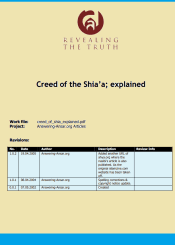Epistle to the Son of the Wolf

Epistle to the Son of the Wolf
Author :
Interpreter :
Publication year :
1891
Number of volumes :
1
Publisher :
Publish number :
FIRST
(0 Votes)

(0 Votes)
Epistle to the Son of the Wolf
The Epistle to the Son of the Wolf is the last major work of Bahá'u'lláh, founder of the Bahá'í Faith, before his death in 1892. It is a letter written to a Muslim cleric, a violent opponent of the Bahá'ís who, along with his father (called by Bahá'u'lláh "the wolf"), also a Muslim cleric, had put to death a number of Bahá'ís. In this work Bahá'u'lláh quotes extensively from his own previously revealed scriptures. This makes a large portion of the work a summary of excerpts on critical concepts expressed in previous works in a condensed form. Two brothers Muhammad-Husayn Nahrí and Muhammad-Hasan Nahrí came from an aristocratic and established mercantile family in Isfahan. The Imám-Jum'ih of the city owed the brothers money and – when the two asked for a payment – he devised a plan to rid his debt. After confronting Shaykh Muhammad-Baqir, another influential Muslim cleric of Isfahan; and Sultán-Mas'úd Mírzá, the son of Násiri'd-Dín Sháh of this issue, the three devised a plan to imprison the brothers on account of their Bahá’í religion. The two brothers were subsequently arrested, paraded around Isfahan with crowds jeering abuse, and publicly executed in a humiliating manner. Bahá’u’lláh was heartbroken by the death of the brothers – he had met the two whilst a prisoner in Adrianople. He eulogized the two, naming them the King and Beloved of Martyrs, and the Twin Shining Lights. Bahá’u’lláh wrote the book in around 1891 to the son of the shaykh, named Áqá Najafí, whom he denounced as the wolf – hence the title Epistle to the Son of the Wolf. Áqá Najafí was also known for his persecution of the Bahá’ís. Bahá’u’lláh calls for him to repent for his and his father's wrongdoings and to investigate the faith.




